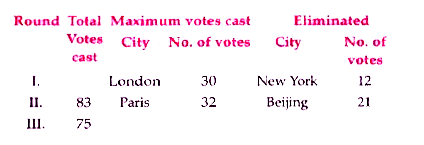Question Stimulus
What is the voting age in India?
21 years
22 years
18 years
1 years
The correct Answer is:C
Similar Questions
Knowledge Check
Question Stimulus
What is the voting age in India?A21 yearsB22 yearsC18 yearsD1 yearsBy which Constitutional Amendment Act, the voting age of Indian citizens has been reduced from 21 years to 18 years?
AConstitution (Sixty-first Amendment) Act, 1988BConstitution (Sixty-second Amendment) Act, 1989CConstitution (Sixty-fourth Amendment) Act, 1990DConstitution (Sixty-third Amendment) Act, 1988Question Stimulus :-
India’s first fighter aircraft is .....AArjunBRudraCMarutDTejas
What is NOT true regarding the voting rights under the democratic system in India?
View SolutionThe Ajanta Cave Paintings are a testimony to the golden age of _____ in India.
View SolutionThe type of age pyramid in India is
View SolutionAnswer the questions on the basis of the information given below:
The year is 2089. Beijing, London, New York and Paris are in contention to host the 2096 Olympics. The eventual winner is determined through several rounds of voting by members of the IOC with each member representing a different city. All the four cities in contention are also represented in IOC.
In any round of voting, the city receiving the lowest number of votes in that round gets eliminated. The survivor after the last round of voting gets to host the event.
A member is allowed to cast votes for at most two different cities in all rounds of voting combined. (Hence, a member becomes ineligible to cast a vote in a given round if both the cities she voted for in earlier rounds are out of contention in that round of voting.
A member is also ineligible to cast a vote in a round if the city (s) he represents is in contention in that round of voting.
As long as the member is eligible, (s) he must vote and vote for only one candidate city in any round of voting. The following incomplete table shows the information on cities that received the maximum and minimum votes in different rounds, the number of votes cast in their favour, and the total votes that were cast in those rounds.

It is also known that:
All those who voted for London and Paris in round I, continued to vote for the same cities in subsequent rounds as long as these cities were in contention. 75% of those who voted for Beijing in round I, voted for Beijing in round II, as well.
Those who voted for New York in round I, voted either for Beijing or Paris in round II.
The difference in votes cast for the two contending cities in the last round was I.
50% of those who voted for Beijing in round I, voted for Paris in round III.
What percentage of members from among those who voted for Beijing in round II and were eligible to vote in round III, voted for London ?
View SolutionAnswer the questions on the basis of the information given below:
The year is 2089. Beijing, London, New York and Paris are in contention to host the 2096 Olympics. The eventual winner is determined through several rounds of voting by members of the IOC with each member representing a different city. All the four cities in contention are also represented in IOC.
In any round of voting, the city receiving the lowest number of votes in that round gets eliminated. The survivor after the last round of voting gets to host the event.
A member is allowed to cast votes for at most two different cities in all rounds of voting combined. (Hence, a member becomes ineligible to cast a vote in a given round if both the cities she voted for in earlier rounds are out of contention in that round of voting.
A member is also ineligible to cast a vote in a round if the city (s) he represents is in contention in that round of voting.
As long as the member is eligible, (s) he must vote and vote for only one candidate city in any round of voting. The following incomplete table shows the information on cities that received the maximum and minimum votes in different rounds, the number of votes cast in their favour, and the total votes that were cast in those rounds.

It is also known that:
All those who voted for London and Paris in round I, continued to vote for the same cities in subsequent rounds as long as these cities were in contention. 75% of those who voted for Beijing in round I, voted for Beijing in round II, as well.
Those who voted for New York in round I, voted either for Beijing or Paris in round II.
The difference in votes cast for the two contending cities in the last round was I.
50% of those who voted for Beijing in round I, voted for Paris in round III.
What percentage of members from among those who voted for New York in round I, voted for Beijing in round II ?
View Solution
